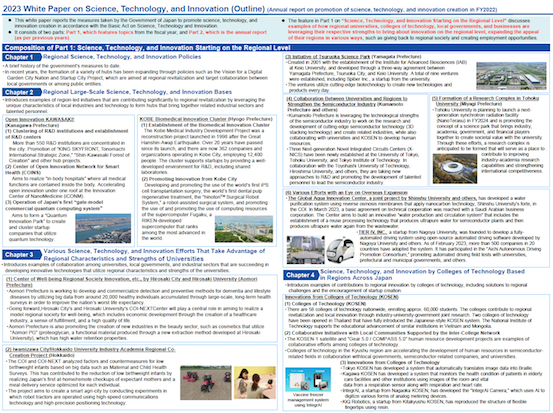JP's STI Policy - Japan's Science and Technology Basic Plan
On the basis of “the Science and Technology Basic Law” (Law No. 130, 1995), the science and technology (S&T) policy in Japan is comprehensively in a planned pursuant to the Basic Plan, which is determined every five years. The environment, energy resources, food security and the spread of infectious diseases have become global issues. The Great East Japan Earthquake (GEJE) caused an unpreceded crisis for Japan and posed a great challenge to the rest of the world. These diverse global problems need to be addressed through the cooperation of all the countries in the world, and Japan should capitalize on its advanced S&T in order to take a leadership role in solving these problems.
Under these circumstances, the 4th Basic Plan presents five major goals that Japan aims at attaining through the following S&T policy objectives:
- Reconstruction and revival from the disaster focusing on robust recovery from and reconstruction after the GEJE
- Promoting Green Innovation focusing on the environment and energy
- Promoting Life Innovation focusing on medical care, nursing care and health management
These policy objectives are defined as key factors for the sustainable growth and development of Japanese society for years to come. The basic Plan also identifies Key challenges to the Priority Issues Facing Japan and states that efforts should be focused on these priority issues instead of specific limited S&T areas. It is also stated that the science, technology and Innovation (STI) policies including system reforms should be comprehensively implemented to address the priority issues in an integrated manner. Basic research and human resources development are another integral part of the efforts for addressing the priority issues; thus, the Basic Plan emphasizes the need for
- drastic enhancement of basic research from a long-range perspective;
- the development of young researchers who will play active roles in S&T research in the future; and
- the development of an international-standard research environment and infrastructure.
With the recognition that S&T policies need to be developed an advanced in the social context, the Basic Plan underlines the importance of public participation in policymaking processes, the dissemination of information regarding S&T and reforms in the systems for promoting R&D. Regarding the investment in R&D, the Basic Plan aims at increasing the total amount of investment by the public and private sectors to be 4% or more of the GDP, increasing government R&D expenditure to account for 1% of the GDP and increasing the total amount of government investment in R&D during the term of the 4th Basic Plan to around 25 trillion yen. (The amount of government investment was estimated on the assumption that government R&D expenditure accounts for 1% of the GDP and that nominal growth rate of GDP would average 2.8% during the term of the 4th Basic Plan.)
Japan's STI System
Government
- CSTI (Science and Technology Policy. Council for Science, Technology and Innovation, Cabinet Office)
- MEXT (Ministry of Education, Culture, Sports, Science and Technology)
Academy
R&D Implementing Agency
- JSPS (Japan Society for the Promotion of Science)
- JST (Japan Science and Technology Agency)
- A-MED (Japan Agency for Medical Research and Development)
- NEDO (New Energy and Industrial Technology Development Organization)
- JICA (Japan International Cooperation Agency)
- JASSO (Japan Student Services Organization)
- JETRO (Japan External Trade Organization)
Japanese Science Councils (national research institutes)
- JAXA (Japan Aerospace Exploration Agency)
- JAMSTEC (Japan Agency for Marine-Earth Science and Technology)
- NIMS (National Institute for Materials Science)
- RIKEN
- NINS (National Institutes of Natural Sciences)
- NISTEP (National Institute of Science and Technology Policy
- NIER (National Institute for Educational Policy Research)
- AIST (National Institute of Advanced Industrial Science and Technology)
- KEK (High Energy Accelerator Research Organization)
- JIRCAS (Japan International Research Center for Agricultural Sciences)
- NIID (National Institute of Infectious Diseases)
- IPSS (National Institute of Population and Social Security Research)
- NIIP (National Institute of Public Health)
- NCGM National Centre for Global Health and Medicine)
- NICT (National Institute of Information and Communications Technology)
- JAEA (Japan Atomic Energy Agency)
- NIES (National Institute for Environmental Studies)


